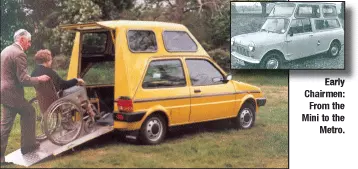|

|
Pioneer celebrates 40 years
AROUND 40 years ago, a British company decided to help disabled people keep on motoring and came up with the design of what is thought to be the first “wheelchair passenger vehicle” – a car for a wheelchair user to travel as a passenger, while remaining in their chair.
The company, Gowrings Mobility, was a pioneer in what has now become a much bigger and more competitive business and over the years it has aimed to stand out for its innovative products and designs, high quality standards and a strong emphasis on the customer.
Based in Newbury, Berkshire, the company started in the 1960s marketing the original “Chairman” based on the British Leyland Austin Mini Countryman. This conversion was built
by sub-contract coachbuilders. By the 1970s, production volumes had grown to 50 or so per year and the Mini had been replaced by the Austin Metro. 
The trademark “Chairman” soon became the product name and the next conversion, based upon the highly successful front-wheel drive Ford Escort van, was called the Chairman Escort.
This design with its raised roof was fondly known for many years as the “Pope-Mobile”.
Other models followed and in the early 1980s the company introduced a more sophisticated conversion with a cut floor and lowered suspension, providing much easier wheelchair access. The company designed a four-point wheelchair securing system, using electric inertia belts
and tie-down straps, and incorporated individual lap and seat belts for the wheelchair user.
In 1985 Gary Newton and Linda Ling, the present owners, joined the business and this marked a big change. 
The decision was taken to manufacture in-house to achieve a greater degree of control over quality and design. By 1994 Gowrings were producing 250 vehicles a year, mainly in-house. In 1994 Gary and Linda decided the company needed to be independent of its owners Gowrings
plc. A management buy-out was agreed and by 1999 production had risen to 350 vehicles a year. The dawn of the new millennium brought yet more expansion.
New markets were developed particularly on the fleet side. In November 2000 the company moved to a purpose-built 45,000sq ft factory in Newbury and also opened a wheelchair accessible Mobility Showroom.
Meanwhile, the major car manufacturers started to design larger MPVs and people-carriers, which transformed the wheelchair accessible vehicle industry.
The naturally high designs of these vehicles meant it was no longer necessary to build in an integral raised roof for improved visibility, and wheelchair users could now travel in vehicles that looked like standard cars. In 2000, production rose to 750 vehicles. Last year the company
hit the magic 1,000.
Gowrings puts its success down to providing a courteous, professional and reliable service and to placing its customers' needs first. In 40 years Gowrings Mobility has come a long way. 
|
|

|

